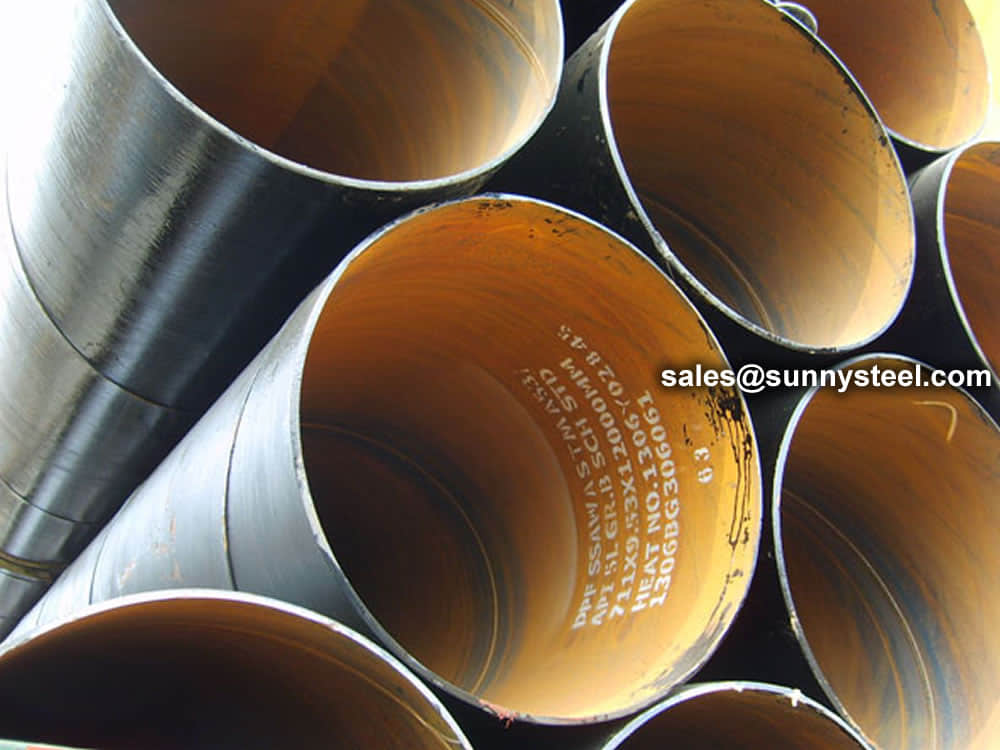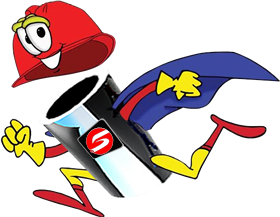Bimetallic Composite Pipe
Read more

High quality steel pipes are produced using three (3) manufacturing processes: Seamless, LSAW (Longitudinal Seam Submerged Arc Welding) and ERW (Electric Resistance Welding).
LSAW and ERW pipes are highly valued for their wide range of applications. They are widely used in foundation solutions and systems, marine construction, structural engineering and various applications in water projects, petrochemical, chemical and power industries, agricultural irrigation, urban construction and more.
The diameter range of LSAW pipes is normally from 16 inches to 60 inches (406mm to 1500mm). They have good performance in high pressure resistance and low temperature corrosion resistance.
However, Sunny Steel can supply pipes from 1 inch to 167 inch (21mm to 4267mm) in diameter and thicknesses from 3/32 inch to 4 inch (2.1mm to 100mm). Sunny Steel's largest diameters and thicknesses are produced using LSAW, which is highly recommended for load bearing piles, combination wall piles and other applications. In the oil and gas industry, large diameter API 5L LSAW pipes are used to efficiently transport hydrocarbons over long distances.
The diameter range of HSAW (Helical Submerged Arc Welding) or SSAW pipe is generally 20 inches to 100 inches (406 mm to 2540 mm). An advantage of SSAW is the ability to obtain different diameters of SSAW pipe from a standard size of steel strip without cutting. On the other hand, the length of the spiral weld is considerably longer than the length of the pipe, making it more costly and prone to cracks, air holes, cinder inclusions, partial welds and more.
HSAW or spiral welded pipes are used for non-critical applications such as water distribution and not for oil and gas. Sunny Steel recommends SSAW as king piles for our combination walls and also as dredging pipe.
Overall it appears that LSAW has a slight advantage over SSAW. The following points explain why.
SSAW pipes have higher residual stresses than LSAW pipes. LSAW pipes undergo a uniform expansion process.
The phenomenon of weld stress concentration in SSAW pipes is considered serious by category. The heat affected zone of SSAW pipes is larger than that of LSAW pipes. Heat affected zones are considered as weak points where failure may start.
The geometric accuracy of LSAW pipes is better than that of SSAW pipes, a key to ease of installation.
The weld line of LSAW pipes is about 60% less than that of SSAW pipes.
Steel plates can be used to test the quality of LSAW pipes using non-destructive methods. While SSAW pipes using hot rolled coils should be tested by destructive methods such as X-ray.
LSAW pipes are welded after forming, where various tests can be performed. SSAW pipes are formed and welded at the same time, with no prior inspection.
Sunny Steel's wide range of steel pipes also includes ERW pipes. ERW pipes are manufactured from steel coils: the coil is first unwound, smoothed, cut and finally formed into a pipe shape by joining its two ends by high frequency electric welding (HFI & HFW). Available in sizes from ½ inch to 20 inches (12 mm to 508 mm), ERW pipe is fast becoming a popular alternative to seamless pipe, both in terms of price and performance.

When you partner with Sunny Steel, you can stop worrying about meeting deadlines thanks to our responsive and timely service. You'll also say goodbye to unnecessary shopping around. Instead, you'll get white glove service from an expert who understands your needs and can get you the materials you need quickly.
